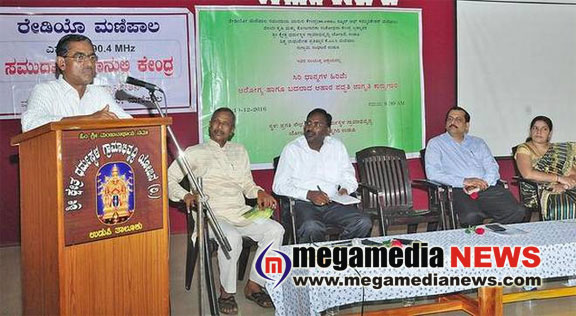Scientist stresses need for consumption of millets
10:38 AM, Monday, December 12th, 2016 Mangaluru: Prabhakar Bhat, principal scientist, All India Project for Small Millets, Indian Council of Agricultural Research (ICAR), said on Saturday that it was essential to consume millets as they were more nutritious and had medicinal value.
Mangaluru: Prabhakar Bhat, principal scientist, All India Project for Small Millets, Indian Council of Agricultural Research (ICAR), said on Saturday that it was essential to consume millets as they were more nutritious and had medicinal value.
He was speaking after the inaugurating an awareness programme on millets organised by Radio Manipal, a community radio station, Zonal Agricultural and Horticultural Station (ZAHRS), Sri Kshetra Dharmasthala Rural Development Project (SKDRDP) and other organisations, here.
Dr. Bhat said that consumption of millets helped control many diseases including blood pressure, indigestion, and cancer. All six millets were being grown in the State especially Southern Karnataka, barring coastal areas. They are finger millet, barnyard millet, foxtail millet, kodo millet, proso millet and little millet.
After the advent and implementation of Green Revolution in the country, the millets had taken a back seat. Farmers began cultivating rice and wheat as they got more yield and they were more commercial crops also.
But the mass cultivation of wheat and paddy had also spoiled the health of the soil and also the health of the people. “By consuming these cereals only, we are inviting many diseases,” he said.
Before the advent of Green Revolution, people had been consuming millets. But now the consumption of millets was less. “We should start using these millets,” he said.
In the coastal belt of the State, only foxtail and proso millets could be grown, that too, only during summer. The millets could not be grown during the rainy season in the coastal belt.
The millets took little moisture and grew fast. The millet crop came up in 70 to 120 days. The fodder quality of millet for cattle also was good. “The millets are highly nutritious for cattle also,” Dr. Bhat said.
Shyam Bhat, coordinator, Radio Manipal; M. Hanumanthappa, Associate Director of Research, ZAHRS, Brahmavar; Arun Maiyya, professor, School of Allied Health Sciences; Sheena Shetty, Director, Jnana Shikshana Trust; and Malathi Dinesh, Project Director, SKDRDP, were present.
Simillar Posts
Warning: count(): Parameter must be an array or an object that implements Countable in /home/megamcaq/public_html/wp-content/plugins/post-plugin-library/common_functions.php on line 357
- None Found
Leave a Reply
© Copyright 2008 www.megamedianews.com All Rights Reserved. Privacy Policy








 Posted in
Posted in  Tags:
Tags: 



